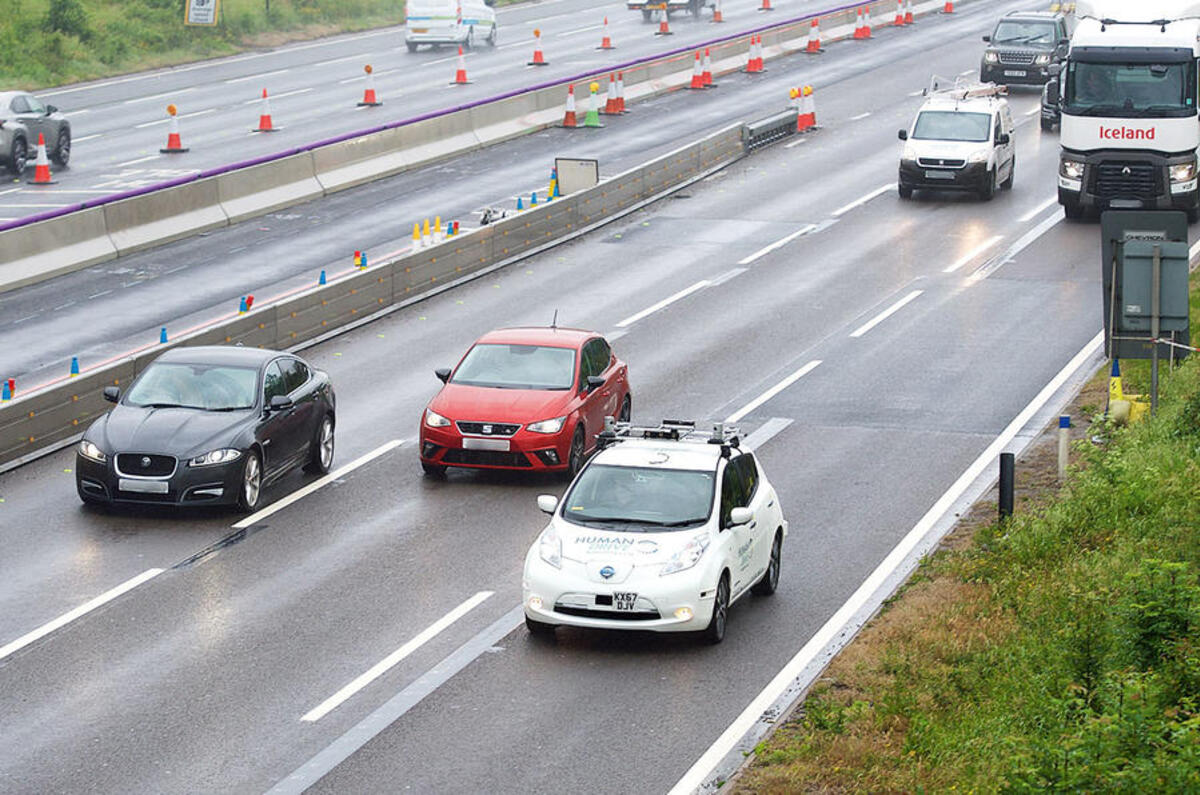The first cars that can drive themselves on motorways will be available to buy in the UK from within the next year, the government has announced, with a full rollout of autonomous vehicles planned from 2025.
New legislation is currently being drawn up that would allow some vehicles, including cars, coaches and lorries, to be purchased in the UK and legally used in full autonomous mode on motorways - although not A-roads or B-roads.
These cars would be more advanced than a Tesla in Autopilot mode, which still requires driver inputs and hands to remain on the steering wheel.
Official papers add that self-driving vehicles to be used for public transport or deliveries will be given the green light to use any UK road from 2025 – and wouldn't require anyone on board to possess a full driving licence.
These new laws – set to be debated in parliament in the coming months – would also cement that manufacturers will be held accountable if an autonomous vehicle crashes, meaning a human occupant wouldn't be liable for incidents if the car was in control.
However, a government-backed report released today by the Centre for Data Ethics and Innovation (CDEI) has warned that there's “no easy answer” on how safe driverless vehicles should be, adding that the question of safety shouldn't be one answered solely by science.
The report notes that if the public expects self-driving cars to be as safe as trains or planes, a 10-fold increase in average safety over human-driven vehicles is required, according to the BBC.
"What we wanted to do was say there's not an easy answer to this question," Professor Jack Stilgoe of University College London, who advised the CDEI, told the BBC.
He added that establishing driverless car safety should be a democratic decision.
Another worry noted in the report is that the public won’t accept any accidents caused by machines operated by artifical intelligence (AI), even if these are safer on average.t
The government has announced that it will be placing a major focus on safety, with an aim to bring in new standards that autonomous vehicles need to meet to be allowed to self-drive on the roads, and sanctions if these standards aren't met.
As well as this, £34 million is to be pumped into autonomous-vehicle safety research as part of the new legislation. This will look at the performance of self-driving cars in poor weather conditions and how they interact with pedestrians, other vehicles and cyclists. This cash is part of a wider £100m kitty to kick-start the autonomous vehicles sector in the UK.
Transport secretary Grant Shapps said: “The benefits of self-driving vehicles have the potential to be huge. Not only can they improve people’s access to education and other vital services, but [also] the industry itself can create tens of thousands of job opportunities throughout the country.
“Most importantly, they’re expected to make our roads safer by reducing the dangers of driver error in road collisions.”
However, AA president Edmund King has a more tentative view. He said: “It's still quite a big leap from assisted driving, where the driver is still in control, to self-driving, where the car takes control.








Join the debate
Add your comment
It will work well very soon on specifically designed roads. So no pedestrians, proper road markings, proper junctions/slip roads, etc. But motorways are already one of the safest road types.
Real world outside that I'd say is a decade away.
Model 3 is impressive on properly marked dual carriageways day and night already though. Drove around 60 miles in the dark last week between Aberdeen and Dundee with it on at 72mph, It reduced to 50mph by itself in a short limit, then back up to 72 after by itself. It centres in the lane well (I prefer slightly right of the centre when driving), and steers just a fraction later than I would naturally. Only issue is it gets confused and slows down at a particular junction near Dundee - not sure why yet, but maybe sees a 30 sign off to the side that I haven't seen.
Pie in the sky nonsense. The AI needed to drive a car on any road in Britain, with all the road works, suicidal cyclists, mobile phone zombie pedestrians and other human drivers does not exist and will not be developed in the next 10 years at the very least if ever. Other publications have covered this story but have pointed out all the issues facing the software developers as well as the moral issues, most notably the "trolley problem" set out in 1967 by Phillipa Foot, namely, should the trolley/driverless car hit one pedestrian and kill them to save the four passengers in the trolley/driverless car? This dilemma cannot be solved. Until it is driverless cars cannot take to the streets. The government should spend the £100 million allocated to this utter waste of time to improving the road, getting rid of low traffic neighbourhoods and generally reducing fuel duty. It should also be noted that most US based driverless car programs are winding up as they cannot solve the issues needed to make driverless cars work.